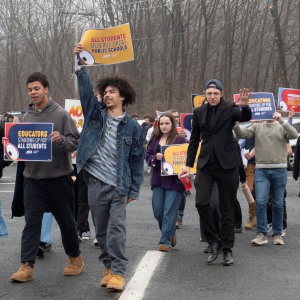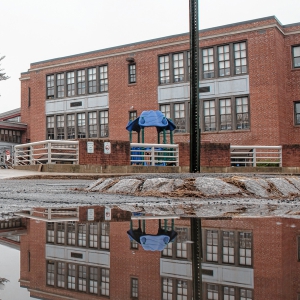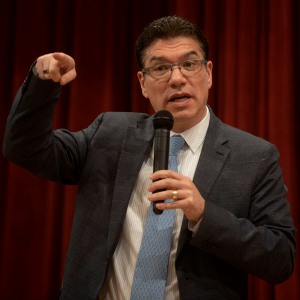Guest columnists Wendy Berg and Mark Reynolds: Polluters should pay at the border
| Published: 02-20-2024 5:23 PM |
The magnitude of global climate change has come home to us in Massachusetts. Last summer, flooding caused by intensive storms washed away roads and other critical infrastructure, destroying the crops on many local farms and in our community gardens.
Wildfire smoke from Canada has added to air pollution, harming our health and limiting our outdoor activities. This winter, snowfall in Massachusetts has been below normal levels. Local kids wait in vain for snow they can play in and for ponds to freeze so they can skate. On average there are now 15 fewer nights when the temperature dips below 28 degrees than there were 20 years ago.
Massachusetts is far from alone in this experience. In 2023, communities nationwide saw their lives impacted by unparalleled weather and climate extremes such as wildfires and drifting toxic smoke, droughts, flooding, storms, and record precipitation. Scientists also confirmed last year was the hottest year on record globally.
The destruction and mounting costs from these events are tragic enough. What’s worse? It’s happening because of the ongoing actions of big polluters, many of which are countries the U.S. conducts trade with. They’re pumping Earth’s atmosphere full of carbon pollution, leading to a warmer world and more extreme weather.
As individuals, we sometimes have no choice but to drive a gas car to work, or heat our homes with fossil fuels so our families are warm during winter. We can do our best to make climate-friendly choices, transitioning to clean energy and taking responsibility for reducing our individual carbon footprints. But the carbon footprints of the world’s biggest polluters dwarf our own, and they must be held accountable. In short: Polluters should pay.
It’s a simple idea — and most Americans already support it. A recent poll revealed that 76% of Americans think large polluters should pay for the destructive emissions that overheat the planet and tarnish our air.
According to the 2023 Yale Climate Opinion Maps, 72% of people right here in MA Congressional District 2 support taxing fossil fuel companies. The same idea should hold true for our trading partners on the international stage.
And of course, America should do everything possible to reduce our country’s own carbon pollution. We’re heading in the right direction — U.S. emissions declined 1.9% in 2023 (Rhodium Group), and our economy produces fewer emissions during manufacturing than similar industries overseas. Yet foreign polluters with lower environmental standards can undercut American manufacturers without penalty.
Article continues after...
Yesterday's Most Read Articles
 Nearly all of South Hadley High’s student body holds ‘walkout to walk-in’ rally to oppose cuts, call for funding reform
Nearly all of South Hadley High’s student body holds ‘walkout to walk-in’ rally to oppose cuts, call for funding reform
 Northampton schools probe staff response to student’s unfulfilled IEP
Northampton schools probe staff response to student’s unfulfilled IEP
 UMass basketball: Minutemen land Florida Tech transfer Donovan Brown
UMass basketball: Minutemen land Florida Tech transfer Donovan Brown
 UMass Chancellor Reyes outlines changes amid financial uncertainty under Trump administration
UMass Chancellor Reyes outlines changes amid financial uncertainty under Trump administration
 Northampton Housing Authority boss placed on leave
Northampton Housing Authority boss placed on leave
 Four Red Fire Farm workers arrested as part of ICE operation in Springfield
Four Red Fire Farm workers arrested as part of ICE operation in Springfield
Increasingly, countries are moving to hold polluters accountable, often through trade. With 30% of global emissions presently generated by the production and transport of exported and imported goods, it’s a great place to start.
The EU and the U.K. have begun the process of imposing a carbon border adjustment mechanism (CBAM) to collect a fee at the border from high-polluting countries that undercut their domestic manufacturers with cheaper, carbon-heavy products.
This policy idea has bipartisan appeal in the U.S., too, since 75% of U.S. imports come from countries with production processes that are more carbon-intensive than we have here at home. In November, Republican Sens. Bill Cassidy and Lindsey Graham introduced the Foreign Pollution Fee Act. Just weeks later, Democrats in the House and Senate reintroduced the Clean Competition Act.
Both bills propose a fee on key materials such as aluminum, cement, iron and steel, and fossil fuels based on their carbon pollution. These policies would level the playing field by charging dirty importers for the difference between their high-emission products and our cleaner domestic goods — and incentivize other countries to do better.
Both bills also include measures intended to exempt developing nations from some or all of the carbon price, to avoid damaging the economies of poorer countries that are not responsible for much of the world’s carbon pollution.
It’s clear that, with a little compromise, legislators can introduce bipartisan CBAM policy that appeals to both sides of the aisle.
When big polluters get a free pass to harm the planet, they cost our communities dearly. It’s time for them to pay a price.
Wendy Berg is a volunteer with the Pioneer Valley chapter of Citizens’ Climate Lobby. Mark Reynolds is the executive director of Citizens’ Climate Lobby.








 Carolyn Cushing: Stop perpetuating dehumanization
Carolyn Cushing: Stop perpetuating dehumanization Guest columnist Emily Quintana, Kate Kruckemeyer, and Stephanie Baird: Fighting ICE attack on principle of sanctuary
Guest columnist Emily Quintana, Kate Kruckemeyer, and Stephanie Baird: Fighting ICE attack on principle of sanctuary Laurel Gardner: Are ADUs for residential housing or for profit?
Laurel Gardner: Are ADUs for residential housing or for profit? Ava Gips: Join national day of protest on April 5
Ava Gips: Join national day of protest on April 5
